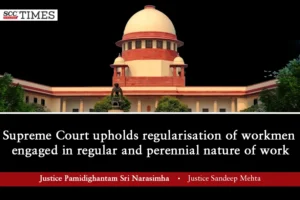Supreme Court: In an appeal by a subsidiary of Coal India Ltd. Challenging High Court’s dismissal and thereby upholding Industrial Tribunal’s decision of regularization of some workmen, the Division Bench of Pamidighantam Sri Narasimha* and Sandeep Mehta, JJ. found the same justified based on specific facts while clarifying that workmen engaged in regular and perennial nature of work could not be contractual but entitled to regularization.
Factual Background
The appellant floated a tender for transportation of crushed coal and selected a successful contractor for performance of agreement from 1984 to 1994. This made the Contractor to employ workmen for execution of this contract. The Union espoused the cause of the workmen who were engaged by the contractor and sought permanent status for them, relying upon clauses 11.5.1 and 11.5.2 of the National Coal Wage Agreement-IV dated 27-07-1989 wherein, it was agreed restricting the employer from engaging contract labour with respect to jobs which were permanent and perennial in nature and such jobs to be executed through regular employees.
After representation by the Union, the Assistant Labour Commissioner sent a notice for conciliation, and the process culminated in a settlement on 5-04-1997 under Rule 58 of the Industrial Disputes (Central) Rules, 1957. Considering that the settlement was confined to only 19 workmen, the Central Government referred the entire dispute to the Industrial Tribunal under Section 10(2A)(1)(d) of the Industrial Disputes Act, 1947 on 20-05-1997 wherein, 3 witnesses were examined by workmen and 4 witnesses were examined by the management.
The Industrial Tribunal vide judgment dated 23-05-2002 allowed the dispute and directed regularization of remaining 13 workmen. The Tribunal proceeded with considering nature of work of 13 workmen and held that the work of removing spillages in the railway siding, below the bunker and operation of chutes (in the bunker) were regular and perennial in nature. The Tribunal further concluded the nature of work to be perennial. The appellant — Coal India’s subsidiary challenged the said decision through a writ petition before the Orissa High Court which was dismissed on 11-11-2021, hence, the instant appeal.
Court’s Analysis
The Court hinted at the substantive part of appellant’s submission that a settlement under Section 18(1) read with Section 36 of the Industrial Disputes Act is binding on all the parties under Section 19(2) of the Act. The Court further stated that the facts leading to settlement followed by reference to the Industrial Tribunal and its award were crucial for the Court’s consideration.
It noted that all the 32 workmen commenced their work through the contractor from 1984 and continued till 1994, when the Union espoused the cause of all 32 workers, and the Assistant Labour Commissioner took up the entire cause, which led to settlement dated 5-04-1997 which talks about claim of 32 workers raised by the Union, and the management’s contention that others were engaged in ‘purely casual’ nature of jobs. The next sentence led to regularization of 19 contractors out of 32 workmen, and the Government invoked power of reference to refer the matter to the Tribunal for adjudicating the interest of all 32 workers.
The Court said that the Tribunal was naturally bound by the reference to consider the claim of all the 32 workers and highlighted the fact that despite there being a settlement w.r.t. some of the workmen, the Tribunal was asked to examine the entire reference and give independent findings on the issue. Therefore, the Court found the Tribunal justified in giving an award on a reference by the Central Government, Tribunal’s findings as unassailable, and High Court having correctly rejected the writ petition. The Court expressed that “Apart from the concurrent findings of fact, we see no substantial question of law in these appeals.”
The Court even otherwise distanced itself from exercising jurisdiction with the explanation that the 32 workers who entered appellant’s service in 1984 continued without interruption till 1994, when the Union sought permanence, and the appellant – Coal India’s subsidiary’s stance in the settlement arrived at w.r.t. 13 workers reflected their eligibility for regularization.
The Court expressed that “It is proved that the remaining workers stand on the same footing as the regularized employees, and they were wrongly not made part of the settlement.” The Court held the Tribunal justified in answering the reference and holding the same status as regularized employees and did not deem fit the ‘artificial distinction’ between 13 workmen from the rest of 19. The Court regarded the instant matter as “a case of wrongful denial of employment and regularization, for no fault of the workmen”.
Regarding payment of wages, the Court opined that the workmen were entitled to back wages as decided by the Tribunal. However, hinting towards the long-drawn litigation affecting the parties, considering public interest, the Court confined the calculation of back wages from the date of Tribunal’s decision, i.e., from 23-05-2002.
[Mahanadi Coalfields Ltd. v. Brajrajnagar Coal Mines Workers’ Union, 2024 SCC OnLine SC 270, decided on 12-03-2024]
Judgment authored by: Pamidighantam Sri Narasimha
Know Thy Judge | Supreme Court of India: Justice Pamidighantam Sri Narasimha
Advocates who appeared in this case :
For Petitioners: Advocate Soumyajit Pani, Advocate on Record Siddharth Jain
For Respondents: Senior Advocate Ashok Kumar Panda, Advocate on Record Tejaswi Kumar Pradhan, Advocate Manoranjan Paikaray, Advocate Shashwat Panda, Advocate Ritwik Kumar

